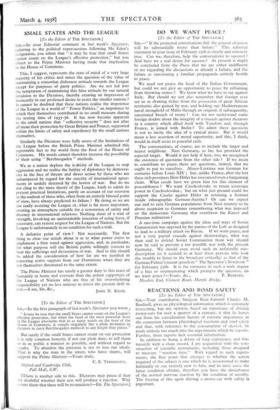DO WE WANT PEACE ?
[To the Editor of THE SPECTATOR.] SIR,—" If the projected conversations fail, the general situation will be substantially worse than before." This editorial statement in your issue of February 25th is clearly and seriously true. Can we, therefore, help the conversations to succeed ? And have we a real desire for success ? At present it might be concluded from the Press that we are either indifferent or are regarding the discussions as already a failure, and the failure as sanctioning a familiar propaganda entirely hostile to peace.
We need not praise the head of the Italian Government, but could we not give an opportunity to peace by refraining from throwing stones ? We know what we have to say against Italy. But should we not also remember that foreign eyes see us as drawing riches from the possession of great African territories also gained by war, and holding our Mediterranean naval stronghold of Malta through an original, if subsequently, sanctioned breach of treaty ? Can we not understand some foreign doubts about the integrity of a crusade against dictators in a country which allied itself with Tsardom and, through France, is joined with Stalin ? To admit these questions is not to invite the idea of a cynical peace. But it would mean a less assertion of moral superiority, and this, I think, would in itself assist to peaceful ends.
The conversations, of course, are to include the larger and nearer neighbour. Nazi Germany, so far, has provided the especial target. Would it not help if here, too, we recognised the existence of questions from the other side ? If we mean to contribute to peace, there are questions, indeed, that we ought to put to ourselves. Alsace-Lorraine was German for centuries before Louis XIV ; but, unlike France, after she lost these rich provinces Herr Hitler has renounced even a bargaining claim. What credit have we given him for this element of peaceableness ? We want Czechoslovaks to retain sovereign power in Czechoslovakia ; but on what just ground could we support the Czechs against Hitler in retaining a frontier inside ethnographic German-Austria ? Or can we expect our zeal to save German populations from Nazi tyranny to be above suspicion to Germans remembering what was imposed or the democratic Germany that overthrew the Kaiser and Prussian militarism ?
A one-time campaign against the ideas and ways of Soviet Communism was opposed by the parties of the Left as designed to lead to a military attack on Russia. If we want peace, and not a very partial crusade against dictatorships, what was then said to defend Soviet Communism from war should now be said to prevent a too possible war with the present Germany. We should even avoid such an unfriendly mis- description (as it seemed to at least three persons who took the trouble to listen to the broadcast critically) as that of the German Fiihrer's recent speech in " The Spectator's Notebook " for February 25th. It is the existence in such a wide degree of a bias so overmastering which prompts the question, do
we want peace ?—Yours, &c., P. REDFERN. Meadow End, Clement Road, Marple Bridge.






































































 Previous page
Previous page